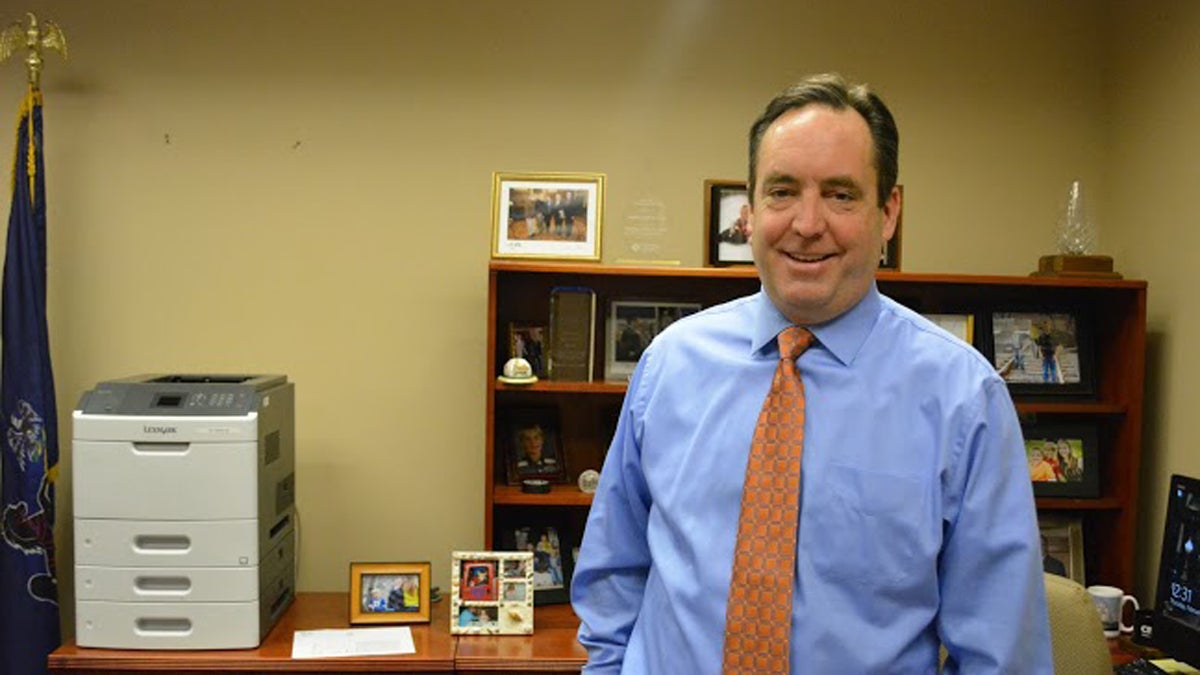New Pa. Senate majority leader Corman: Pension overhaul before any Wolf tax measures
Listen
Centre County's Jake Corman, the Pennsylvania Senate majority leader. (Kevin McCorry/WHYY)
On Tuesday, Pennsylvania Gov. Tom Wolf will unveil a state budget proposal that will crystallize his plan for increasing education spending while also dealing with the state’s $2.3 billion structural deficit.
In order for Wolf’s agenda to pass, which will likely include a slate of tax increases and expansions, he must first find a way to compromise with the Republican leaders who control the Legislature.
Chief among them is Jake Corman of Centre County. The state Senate’s new, more conservative majority leader has views on overhauling the state-employee pension system that may foil Wolf’s investment-heavy agenda.
Happy Valley
Nestled in the snow-covered mountains of Centre County, a 15-minute drive from State College, Corman’s office sits in the tiny borough of Bellefonte, at the foot of Mount Nittany.
“It’s a lot of rolling hills in the area, lot of great fishing and outdoor hunting and things of that nature,” said Corman, sitting behind his large L-shaped desk.
“Back in the Depression, in the ’30s, this area continued to do well, sort of Depression proof, because the university was driving the economy,” he said. “So it was called Happy Valley.”
On the crooked, wooded roads of Corman’s district, the FM dial reception is spotty, but consistent in the three Cs: country, conservative, and Christian radio.
Voters in the 34th District have been consistent as well, sending a Corman to Harrisburg for nearly 40 years — Jake since 1999 and his father, Doyle, for 21 years before that.
Corman became majority leader in November, narrowly ousting Dominic Pileggi, the Delaware County moderate Republican who had the job since 2006.
Corman, who tends to champion higher-education causes more so than those of K-12, says residents of Southeastern Pennsylvania shouldn’t consider the leadership change a loss.
“As a Republican, we’ve made a living over the years picking on Philadelphia. I don’t think there’s any question about that,” he said, with a laugh. “But we’re as successful as they are. If Philadelphia is a tremendous, thriving city full of opportunity and cultural advances that communities from around the state and around the country want to come see, that’s good for everybody in the state.”
Corman actually started his college career at Temple University, living on Broad Street in North Philadelphia, but he ended up graduating from Penn State’s Main Campus.
“That’s a long story. As I like to tell people, I had my fun at Temple, and I got my education at Penn State. I’ll just leave it at that,” he said. “When you talk about a rural county boy headed to the big city, there’s a whole lot of education to happen there.”
Pension showdown
Now that he’s setting the legislative calendar as majority leader, Corman is drawing a line in the sand – saying he won’t support any of Wolf’s proposals for tax increases until lawmakers deal with what he calls “the elephant in the room.”
In addition to a statewide tax on natural-gas drilling, Wolf may propose increasing the state personal income tax, as well as the state sales tax.
“I’m not even going to discuss new revenue until we deal with the public pension reform,” said Corman. “That’s the structural problem, and until we deal with that, it’s sort of like turning up the heat when you have a hole in your roof. I know that’s an overused cliche, but that’s what it is.”
The state contributes to two pension funds: the Public School Employees’ Retirement System and the State Employees’ Retirement System.
As Corman spoke, he was surrounded in his office by sports memorabilia and framed pictures of his conservative forebears: he and George W. Bush at the University Park Airport; his young daughter in the arms of his former boss, former U.S. Sen. Rick Santorum.
“Everything is being driven in state government right now by our costs,” he continued. “Public pensions are at the top of that. When you have to come up with $600 million new dollars every year for public pensions for our contribution, that ties a hand behind your back for the other investments you want to make.”
The modern-day pension debate in Harrisburg can be traced back to a piece of legislation that former Gov. Tom Ridge, a Republican, signed in 2001. Then, with pension surpluses high, Ridge raised retirement benefits for teachers and state workers – including lawmakers – with the backing of the Legislature, including Corman.
When the market went south later that year, following 9/11 and the implosion of the dot-com bubble, investment returns took a tumble, and the surplus evaporated.
“You make decisions based on what you think is going to happen,” said Corman. “It’s easy to look back in hindsight.”
All the while, with cash-on-hand low and priorities elsewhere, the state underpaid on its contributions to the pension fund for much of the 2000s, hoping investment returns would rebound.
Teachers and state workers continued to make their payments, but the unfunded liability grew exponentially during the great recession.
In 2010, lawmakers passed a plan to undo the generosity of the 2001 law for new hires – aiming to reduce the state’s pension debt over the long term.
The next few years, though, have shaped up to be a reckoning. Based on the history detailed above, the state’s pension bill has been rising sharply.
For a longer scope of Pennsylvania’s pension history, see this coverage by the Morning Call.
The state’s Independent Fiscal Office projects that the state’s pension payments will grow from $1.69 billion this year to $3.34 billion in 2019-20.
Overall, the IFO says the state’s general fund will grow from $29 billion this year to $35.4 billion in 2019-20.
Corman says the IFO’s estimate is too conservative. He expects the state budget will grow to $40 billion over the next four years unless the Legislature acts on a pension overhaul.
“That’s why [Wolf is] talking about raising taxes across the board, because there’s no shale tax that’s going to cover that cost,” said Corman.
But the only way to realize immediate pension savings would be to cut benefits to current employees, which many lawmakers find both legally questionable and morally reprehensible.
The Corbett administration advanced this plan, but even with Republican majorities in the legislature, consensus couldn’t be found.
Despite this fact, Corman believes a pension-overhaul bill has a shot under Wolf.
“It’s sort of like you’re standing on the beach and a tsunami is coming your way. And maybe you’re sort of like looking at the waves for a while, but sooner or later it’s going to hit shore,” he said. “This tsunami is hitting shore right now.”
‘I’m going to pay’
Corman sees that storm and wants to restructure the entire system, reducing benefits for existing employees back to pre-2001 levels and pushing new employees into a 401(k)-style, defined contribution plan.
This would shift investment risk away from the state and toward employees.
“When times are good, you give an enhancement; when times are tough, you go back to where you were,” said Corman. “I don’t think that’s unreasonable.”
Democrats, Wolf chief among them, point out that once the state pays down its debt, the current spike in pension payments will subside. Defined benefit plans, they say, are also more cost efficient and provide more security for retirees.
“I think the big problem in Pennsylvania is not with the public sector, is not with the plan design. It’s the fact that we haven’t paid for so long,” said Wolf after a public event in Philadelphia Friday. “And I’m not going to keep doing that. I’m going to pay.”
On Tuesday, before Wolf reaches the final mark of punctuation in his budget address, Harrisburg will be awash in ideologically and politically driven fervor.
In the days and months after, as Wolf attempts to garner support for his tax package, the pension debate will rise to the top of any negotiations with Republicans – with Corman as one of the gatekeepers.
WHYY is your source for fact-based, in-depth journalism and information. As a nonprofit organization, we rely on financial support from readers like you. Please give today.





